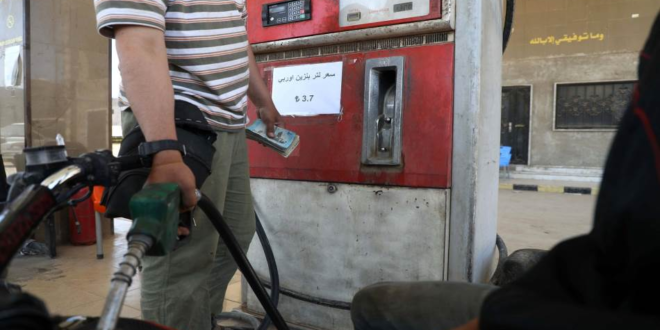Ongoing protests in the rural areas of Aleppo have shed light on the monopolistic practices of the al-Anwar Company, according to al-Modon.
The ongoing protests in the rural areas of Aleppo, currently under the control of National Army factions, have shed light on the monopolistic practices of the al-Anwar Company within the northern Syrian fuel trade. Furthermore, these demonstrations have exposed the extent of Hay’at Tahrir al-Sham’s (HTS) influence in the region, particularly its dominance over the crucial oil market, a cornerstone of the local economy.
This Monday, fuel truck drivers based in the city of al-Bab, situated to the east of Aleppo, initiated an indefinite strike. Their action included the obstruction of several main roads within the city. The primary grievance prompting this protest was the imposition of heightened taxes by the HTS-affiliated Anwar company.
Hydrocarbon Market
The Anwar Company’s recent implementation of a new tax, amounting to five dollars per transported barrel from the refinery burners located in the vicinity of Tarhin village near Bab, has led to a substantial hike in the diesel barrel price, reaching $140.
Abu Ahmed, a fuel transporter from rural Aleppo to Idleb, has articulated that the primary objective behind this new tax imposition is to balance out fuel costs between rural Aleppo and Idleb. Additionally, the aim is to resolve the issue of price disparities that have been a source of dissatisfaction among residents within areas under the influence of HTS.
According to Abu Ahmed’s account to Al-Modon, Anwar Company solidified its control over the fuel market by seizing control of the refinery burners in Tarheen village approximately ten days ago. This establishment has been a central and almost sole distributor of oil derivatives to northern Syrian regions, having primarily engaged in diesel and coal trade and distribution.
It’s crucial to note that the ramifications of this new tax aren’t confined solely to tank drivers. Its effects extend to everyone involved, resulting in an increase in transportation and distribution costs. Consequently, these elevated costs are passed on to the populace, thereby influencing a multitude of sectors, industries, and even bakeries that are compelled to raise the prices of their goods.
Anwar Company, having secured concessions from Watad Hydrocarbons, initially dealt in coal trading and distribution within the north. Subsequently, it expanded its influence by gaining a monopoly over the diesel market. This was achieved through control over oil imports from territories managed by the Syrian Democratic Forces, facilitated by the Ahrar Olan faction of the Ahrar al-Sham movement, particularly its eastern sector known for its alignment with HTS.
Despite recent developments discrediting the explanations provided by the Salvation Government—HTS’ civil arm—regarding the root causes of the fuel crisis within their controlled zones, including the suspension of supplies from the Turkish port of Mersin, these events underscore the fragility of the National Army’s authority and the Interim Government. Furthermore, they underscore the apparent disregard of de facto powers toward the population’s conditions and the escalating tensions. This situation has the potential to incite a fresh upheaval akin to the ongoing revolutions in areas under regime control.
 Eurasia Press & News
Eurasia Press & News




